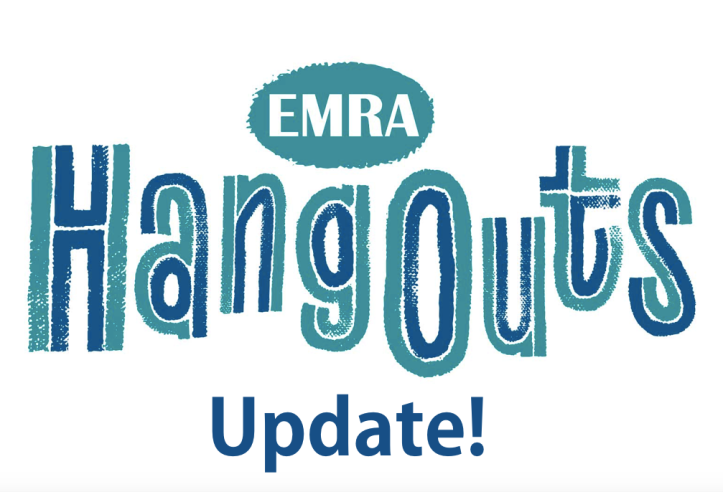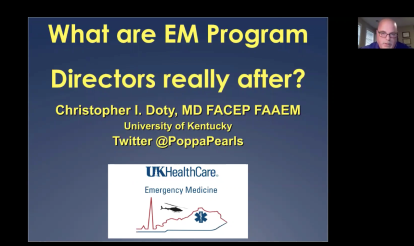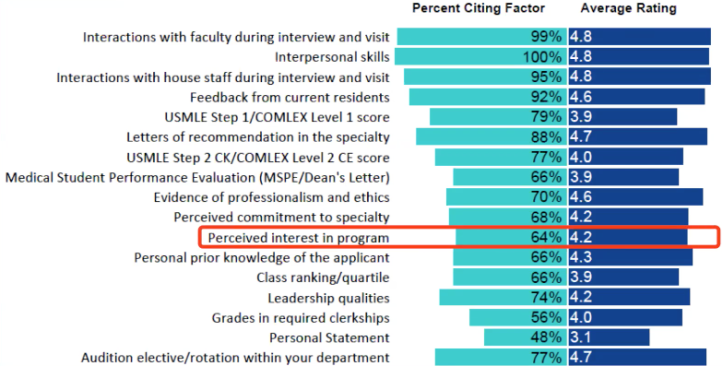Author: Linda Katirji MD, Emergency Medicine Resident, University of Kentucky Medical Center, on behalf of the CORD Student Advising Task Force (SATF)

As students embark on their away rotations and interview season draws near, we wanted to highlight a particularly useful resource for fourth year medical students applying to emergency medicine and those who advise them.
EMRA Hangouts are monthly online presentations by EM program directors and other leaders in academic emergency medicine. Medical students can virtually attend and ask questions via audiovisual online streaming technology. The hangouts take place on the first Thursday of every month at 7:00 pm central time. A full introduction to this resource posted previously on this blog can be found here. This post serves as an update on some of the sessions, and highlights some of those relevant to away rotations and interviews.
“How to Ace your Audition Rotations”
Christopher Doty, MD, FACEP, FAAEM (@PoppasPearls), Associate Professor and Vice Chair of Education at University of Kentucky Emergency Medicine program

Your audition rotations are your opportunity to shine as a medical student and demonstrate your dedication and passion for emergency medicine. Your best chance of matching at a program is to rotate there. Dr. Doty gives his tips on leaving a good impression. Here are some of the pearls from his hangout:
- Pick wisely where you go on your audition rotations
- Does location matter to you? An academic vs. community place?
- If you are an IMG, try to rotate at a program that has taken IMGs
- At your audition rotation, showcase what makes you “you”
- Don’t be a wallflower and go unnoticed
- Showcase the things that make you special and what you are excited about without being cocky
- The “lethal triad” for residents: arrogance, stupidity, laziness
- Your goal should be to show programs that these aren’t traits that you possess
- Show up early. Stay late. Read about your cases. Be nice to everyone in the ED (nurses, housekeeping, etc).
- Your audition rotation is the time to ask, “do I vibe with these residents?”
- Each program has its own feel. Gather the information you need to see if the program is a good “fit”
- Ask yourself, do you fit in with the shared vision of the program?
- Your best chance at matching at any program is to rotate there.
- September/October is not too late for a second SLOE
- Try to get your first SLOE in by September
- The only time it’s too late to submit a SLOE is after rank lists are done.
- Take a look at what’s on a SLOE, know how you are evaluated (example here)
- Letters that are not SLOEs are not as useful
View the entire session here.
“Interview Day and More”
Cedric Lefebvre, MD, FACEP, Program Director Wake Forest School of Medicine
Lucienne Lufty-Clayton, MD, FACEP, Associate Program Director UMass-Baystate
Interview season can (and should) be a fun time! Dr. Lefebvre and Dr. Lufty-Clayton give tips for your interviews. A few pearls from their hangout are below:
Pre-interview:
- Communication with programs:
- Be polite and prompt in scheduling your interview and any other communication before your interview day
- Try not to make a lot of requests as this can give the impression that you are demanding
- Pro-tip: Pack an extra set of business casual clothes in your carry on bag in case your bag gets loss
- Do your homework – research the program
- Look through the website
- If you are able to see in advance who will interview you, spending some time researching your interviewers may set you apart and give you some things to talk about
- Practice an interview (with someone, or video yourself) so you can see how you interact with people
- Try and plan to attend the pre-interview dinner
- Listen to how the residents are interacting and the stories they tell
- Don’t mistake “war stories” for complaining
- A lot of physicians will cope with the stress of the ED by sharing stories about cases or experiences
- Look out for true discontent or dissatisfaction with their experience
Rules to the road: the interview!
- Wear a suit!
- Try the suit on prior to your interview and make sure it is fitted well
- Dressing professionally and looking sharp gives the impression that you are taking the interview seriously and interested in that program
- Be respectful
- Don’t put down any programs – no trash talking
- No swearing
- Some of the most difficult questions address experiences in your life where you have dealt with conflict, failure, or difficult ethical situations.
- Try and think of examples of when you had to deal with this before your interview
- Even better – an experience that highlights part of your CV
- Trouble spots on your application
- They are noticed by interviewers and they WILL come up
- This is your time to offer your perspective on it
- Don’t run from it, own it.
- Make sure your body language portrays your interest
- Sitting up, leaning forward shows engagement in your conversation
- If you don’t project the right body language, people will think you aren’t interested, or you won’t care case a resident
- You are setting the tone as who you will be as a resident and learner: be energetic and engaged
- Don’t feel bad about canceling an interview, however make sure you give enough notice
- 2 weeks is great, 1 week is alright, its hard for the programs to fill a spot in less than one week
- If you have an emergency and need to cancel last minute its ok, call the program and let them know, they know that things like this can occasionally happen.
Post interview and follow up:
- A thank you note is a good idea
- You can only win by doing this
- If you still have questions about the interview, you can spend time doing a “second look”
- Don’t do this for every program, you will burn yourself out
- If there is a program that you are really liked but want a little more information, or are questioning if you will fit in, that is a good reason to do it
- If there is a particular program that you think will be ranked in your top few, it is reasonable to send a note telling them that
- It probably won’t change your rank, it probably won’t harm you
- Do not tell multiple programs they are #1
- You should not change anything about your program based on how much you think a program likes them.
- If you feel like you are not getting enough interviews and it is getting late in the interview season, you should talk with your advisor and come up with a strategy and reach out to programs in a targeted way.
View the entire session here.
“How to make your rank list”
Travis Eastin, MD, MS, Program Director, University of Arkansas
Deborah Pierce, DO, MS, Program Director, Einstein Medical Center
Dr. Eastin and Dr. Pierce talk through the logistics of the match and some tips on how to make your rank list. For those interested in how the match algorithm works, Dr. Eastin explains this in a clear and understandable way in the first 10 minutes. See some pearls from the rest of their talk below:
What do program directors find important in making their rank list?
- Only a few factors are important across the board to all programs
- Personal interactions
- Performance on EM rotations and SLOEs
- About 2/3 of the programs noted that perceived interest in their program was important
- Second visits are only important to about 1/3 of programs and even then, they only find it moderately important

Data from 2016 NRMP Charting Outcomes, demonstrates what % of programs find each factor important, and just how important that factor is (nrmp.org)
Tips for creating your rank list:
- First, think about your most important program features
- Size, geography, diversity, program values, etc
- Make your initial rank list based on the programs that align with those feature
- Then, take a look at your rank list and adjust based on “fit”
- Put all of the programs you interviewed at on your list
- If a program does not meet your “must have” criteria, then you may want to consider not ranking it
- However, you should take a look at your application, scores, etc and compare with the data from NRMP Charting Outcomes and make sure you are putting enough programs on your list to optimize your chance of matching
- The only reason not to rank a program is if you’d rather not match then end up at that program
- If a program does not meet your “must have” criteria, then you may want to consider not ranking it
- The match is weighted in your favor
- Don’t try and outsmart the computer or “play the game”
- Rank in the order of your preference
Next session:
The next EMRA Hangout is September 7, 2017. These sessions are an invaluable resource for anyone going through the EM application process.
